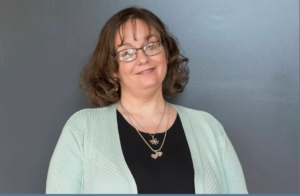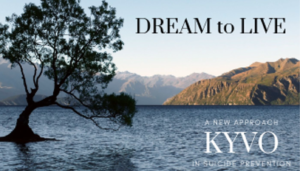It’s 2 a.m., and there’s a police officer sitting on Julie van Ommeren’s gingham-print loveseat. Another stands by his side. But where is Kyle? She hears someone scream, then suddenly realizes the voice is her own.

This is a story of how a liberal arts education – and a custom-made major – can map to more than a college degree, even when it detours to the darkest of places. Van Ommeren ’20 was two weeks into a bachelor of liberal studies program at the University of Mary Washington when her 19-year-old son ended his life in the family van. As she grappled with grief, her schoolwork grew even more personal.
A careful collection of classes and unflagging support from faculty brought meaning to a mother’s worst nightmare and led to a plan to help others. KYVO – named for her son – and “Dream to Live,” the platform and program born from van Ommeren’s coursework, shift the focus of suicide from death to life. Though they have not been officially endorsed, she shares them – and her story – on a website she launched this September, National Suicide Prevention Awareness Month, with deaths on the rise, particularly among young people like Kyle.
She was in her mid-40s when she came to UMW, not to build a career but to learn to be better at the job she already had – being a mom. “There is no greater motivating factor than your own kids,” said van Ommeren, who has two children with special needs, including Kyle.
She’d barely begun work on the “advocacy and mentoring” degree she’d carved out for herself when she learned of Kyle’s death. She waded through sorrow to finish the year, then took time off to wrestle with demons. She’d been trained in suicide prevention, so how had she missed the signs? She needed answers to find her way forward. And she realized Mary Washington could provide them, so she came back to campus with a laser-sharp focus on a complete UMW experience.

“Kyle’s death changed everything about my major,” she said. “I couldn’t accept our failure to prevent my son’s suicide – [nor his death] – without understanding why it occurred.”
Rooted in psychology and sociology, her “liberal arts education on steroids” added clarity, she said. It spanned the College of Arts and Sciences, the College of Education and the College of Business, from math and geology to communication and theatre. It dipped into graduate-level learning and involved all manner of special permissions.
“She wrung every drop of learning out of her classes,” said her advisor, Professor of Sociology and Center for Community Engagement Director Leslie Martin. “She was determined to figure out how each course fit into the whole of her planned major.”
A concept from “Judgment and Decision Making” – humans are wired to choose the easiest path – forms the base of her “Dream to Live” program, grounded in coping, crisis-recognition and conversation. “How to Change the World” led to KYVO, a suicide-prevention organization she hopes to make a nonprofit. “Political Sociology” and “Public Sociology” caused on-campus efforts to foster undergraduate success. A film she made with fellow students about her experience with suicide was shared with Talley Center for Psychological Services trainees.
“Julie has taken her traumatic experiences and challenging moments and focused that energy on trying to make the world a better place for people to live and grow and thrive,” said Director Tevya Zukor.
Van Ommeren joined the Student Government Association, collaborated with business incubator StartUpUMW and planned a public presentation of her capstone project, “Why We Fail to Prevent Suicide, the Blessings of Tragedies,” which was thwarted by COVID-19. She hopes to publish a book about her life.
But an assignment for “Death and Society” – a course van Ommeren needed permission to take so soon after her son’s death – may have left the most lasting impression. Kyle joined her for that one. At the front of the room, with the shiny black box that holds his ashes, she told classmates the story of the police who came to her house at 2 a.m., and the heartbreak – and hope – that came after.
“I’m working with my son to prevent others from contemplating suicide,” she said. “I could never have done it without him.”


